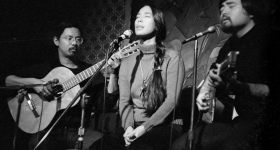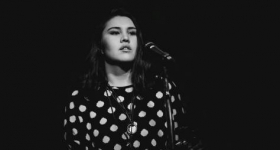“I don’t want to be a doctor,” I said that fateful fall day. “Or an engineer, businessman, scientist. I don’t want any of that.” My father looked at me with disappointment, his eyes dropping and finding their way to the center of his feet. Then his body suddenly twitched, his head shot up and in his eyes I saw a fire.
“I am the parent, you will listen. Mhera pura zhindigi maenae kaam kiyah, mae bhara saal sae aap ki leyah kham keeyah, joh mein bolto aap kharungae.” (My whole life I’ve done nothing but work, I’ve worked these past 12 years for you, you will do whatever I say.)
I looked at him, the weathered man sitting in his brown loveseat in our Queens apartment. His brows were furrowed. A door closed behind me. In an immigrant Muslim household, my parents wanted nothing other than prestige for me, to reach the top in professional fields like medicine or technology. A singer was out of the question.
“You know who becomes an entertainer, son? A bakwas ahdm!” (Useless man.)
I gulped, feeling my heart drop from mouth to stomach. The rules were the rules. Being Pakistani meant I had to follow the patriarchy my family brought over to our one bedroom apartment. My older brother never spoke up against their rules, and I was only 12, why would it be any different for me? “Yes,” I whispered and walked into our family’s bedroom.
***
But, one year later, I found myself approaching the man again. Still weathered, still in his brown loveseat. He did not know that I’d been practicing everyday. For the past year since joining the school choir, I’d felt my ambition rise again. I sang until my voice left me hoarse everyday. I’d sneak out to the backyard of our apartment complex, nights where people were asleep, knowing that even if my parents didn’t catch me, our neighbors could very easily complain and my training would have to end. But I still went, and every night at 9 pm I’d sit on our back doorsteps and sing “Fly Me to The Moon” by Frank Sinatra, “Isn’t She Lovely” by Stevie Wonder and “Grenade” by Bruno Mars.
A little wiser, a little prouder, I said to him: “Let me try. I can show you I have what it takes.” He agreed, the week before the audition date. The usual stern look in his eye had softened. “Just this once.” he told me.
And that’s how on April 25th, 2013, I came to audition for The X Factor.
***
As I entered the Nassau Coliseum that morning, I felt more than the Coliseum doors open. I stopped and assessed myself at a wall-length mirror before the concession booths. Behind me, dozens of people, both auditioners and their supporters passed as I stared at my reflection. Out of the corner of my eye, there was a girl with brown hair and pretty green eyes. Her face was buried in a small hand mirror, but she looked around my age, doing her makeup as her mother tidied her dazzling pink dress she wore under a leather jacket. I hadn’t worn a special outfit, just my usual: a regular pair of black jeans and a grey-checkered button-down. But I was standing proud and happy. I’m here, I thought, I’m really here.
Beneath that was a sense of guilt. My parents did not know that the day of my audition was also that of the New York State Algebra Regents Exam. My Algebra teacher, Ms. Uddin, had openly voiced in front of the class that she didn’t support my audition. Of course, this didn’t surprise me — at this point in my life, a lack of empathy felt like a common theme in most Desi adults.
But after entering the stadium, my body buzzed with adrenaline. Hundreds of people were already sitting in their seats, some with wristbands indicating that they were auditioners, all of them my rivals. I felt a sense of excitement and competition that I had never felt in class. As I heard people practice their songs — some belting and reaching notes I had never reached — I couldn’t help but wonder how many hours they had spent practicing. I wondered if the hours I spent were enough.
A girl no older than 15 was singing my favorite song, “When I Was Your Man” by Bruno Mars, and my heart dropped. I can’t beat someone like that, I thought. In the corner of my eye I saw my father, the man who had no desire to participate in any part of this, turn and look at me with concern. Don’t give up, his eyes told me.
“Section 12 come on down!” a voice yells.
I dragged my shaking legs down to the booth where a young blond woman asks my name and my purpose for being here. “What do you want out of this?” she asks.
“I don’t know, I’m just here to have fun and see where this takes me,” I lied. She couldn’t know the weight I had on my shoulders, the pressure of needing to prove to my father that my dream was not a waste of time; the pressure of being different. I could feel it in the fact that I did not see any other Desi boys auditioning.
“That’s a great attitude!” Now she was lying.
With my father behind the black curtain, listening attentively to his son’s voice, I sang my heart out to “Green Light” by John Legend and Andre 3000, a song that I had found through a cover by one of my favorite YouTubers, David So. Despite the hundreds of voices and notes and screams in the stadium, I heard nothing but my voice. And shortly after, I felt nothing but defeat. I had spent 12 hours at the coliseum just to be told, “Thank you for your audition, can I please see your bracelet?” and have my purple participant bracelet cut off in front of my father.
In the car, I warily turned to my father, who was sitting next to me. He was already looking at me. The fire that usually resided in him seemed to subside into perhaps a memory of a different life, a different person. My father’s eyes, once filled with anger, now shone with admiration.
***
There are many moments where I’m reminded of that first step I took and of my father's choice to understand me. There’s when I told my life’s story in front of strangers during my performance in Undesirable Elements; Generation NYZ at Times Square, and both my mother and father came to my closing show, and every time I proudly bowed for my playwright/directing debut in my show SHARUM at Hunter College and my brother came to support me. There are times on stage when I think, I’m not an X Factor superstar and I didn’t get to live my Zayn Malik dream, but I still have an audience and one hell of a show. In those moments I remember that my identity not only stems from where I’m from, but also in the experiences I make myself.










Comments